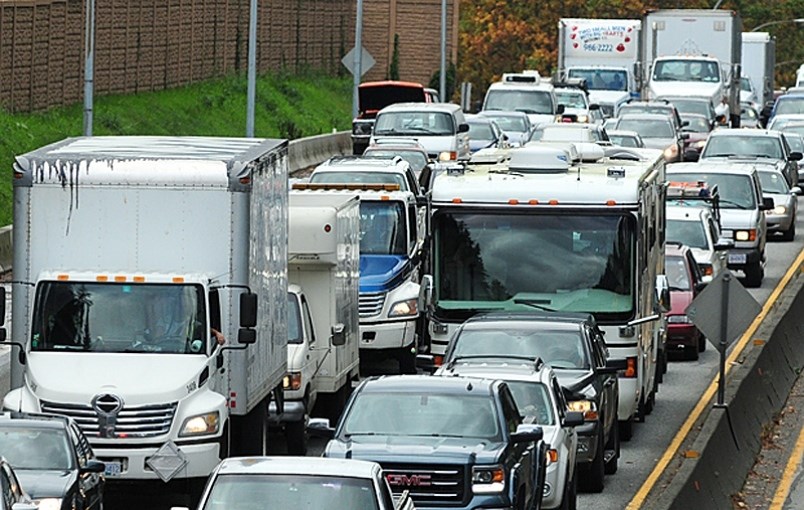No matter where they land on the political spectrum, candidates running for election in North Vancouver all agree that transportation is a major headache and residents would like their governments to fix it.
Candidates from all major parties have pointed to traffic congestion, transit and the general difficulty getting from point A to point B as one of the key concerns they hear about on the doorstep.
Although transportation mainly falls under provincial control, the federal government has a role to play in providing a share of the funding for both roads and public transit.
Both the Liberal and Conservative candidates have been part of governments that provided money for projects like the Lower Lynn highway improvements currently under construction and for the third SeaBus, allowing faster crossing of Burrard Inlet.
Both point to the need for continued infrastructure spending to help keep transportation flowing.
“When I was born in North Vancouver in 1964 we had two bridges to take us over town. We had a population of 60,000. We now have a population of 180,000 people and the same two bridges,” said North Vancouver Conservative candidate Andrew Saxton. “Obviously, there’s an infrastructure deficit.”
“I’ve got good experience in bringing infrastructure dollars to North Vancouver in the past and I’m happy to put that to work for North Vancouver again,” said Saxton.
If elected, “what I’m going to advocate for is to bring SkyTrain to North Vancouver,” said Saxton.
“If we’re going to deal with traffic on the North Shore, we need to get people out of their cars. In order to get people out of their cars we need better public transportation. SkyTrain would definitely be a step in the right direction.”
Saxton said the government will need to look at the feasibility study currently underway to see what options are technically possible and what they would cost. Both a tunnel and a SkyTrain over the rail bridge and along current rail routes are options that could be examined, he said.
Liberal incumbent Jonathan Wilkinson points to projects like the B-Line currently being built as the positive developments the Liberal government has contributed to. But he also says in the long term, “We’re going to have to find ways to bring rapid transit and SkyTrain to the North Shore.” The feasibility study will be important in selling that to TransLink, he said.
Across the country, the Liberals have promised an additional $3 billion Canada-wide in public transit funding per year.
Both the NDP and the Greens are also keen on bringing rapid transit to North Vancouver.
Justine Bell, the NDP candidate in North Vancouver, said her party would “heavily invest in infrastructure” to get people out of their cars and on to transit. That means rapid transit, electrifying buses and making public transit free, she said.
“We need to make [rapid transit] happen sooner than later,” she said.
For George Orr of the Greens, one of the big challenges facing the North Shore on transit is that “the North Shore was developed around the single-family vehicle.”
That makes parts of the community above the Upper Levels highway difficult to serve with transit, he said.
The Greens also favour bringing rapid transit to the North Shore, possibly over the existing rail bridge near the Second Narrows.
Like the NDP, the Greens want to see the bus system run on electricity. The Greens would also ban the sale of conventional gas vehicles in favour of electric vehicles by 2030.
“We don’t need vehicles that run on carbon. The sooner we get to that the better,” said Orr.
The People’s Party doesn’t have a policy on transit and transportation but is opposed to subsidies for electric vehicles, saying their buyers are already rich.
West Vancouver People’s Party candidate Doug Bebb described that as “boomers driving around in Teslas,” calling it a waste of taxpayers’ dollars.



